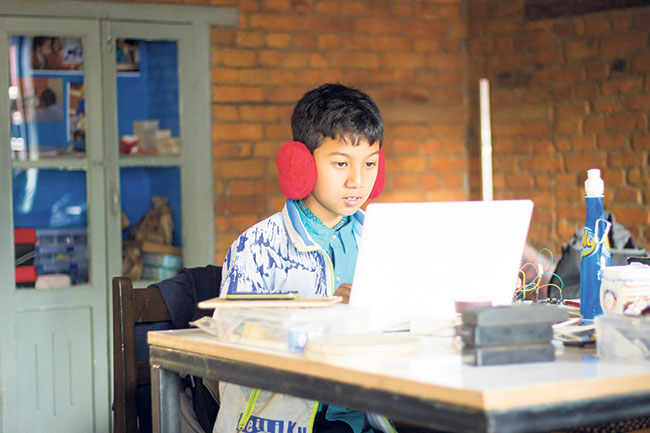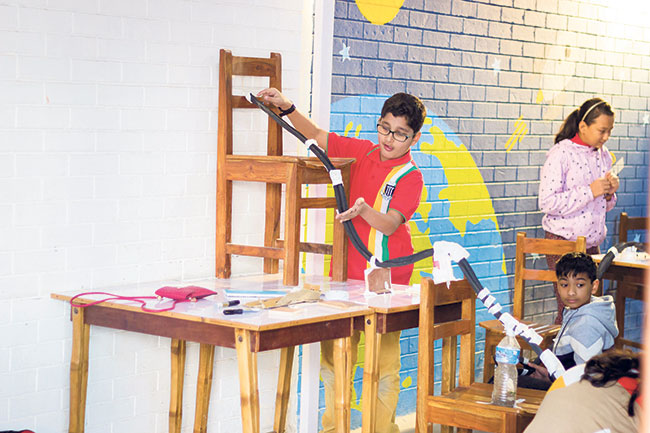Gone are the days when students used to rely on rote-learning books to excel. While the technique might give them some extra marks, only book knowledge is not enough to shine out among the smart generation of students. Also, the conventional teacher-based classroom learning method is now outdated. To learn something, one needs to engage and question everything.
 Unless students make the effort and take the initiative, knowledge will only be transferred, not explored. With this as its core idea, Karkhana has been working with and among students in an attempt to give them a hands-on experience on theories of subjects like Science, Technology, Engineering, Arts and Mathematics (STEAM).
Unless students make the effort and take the initiative, knowledge will only be transferred, not explored. With this as its core idea, Karkhana has been working with and among students in an attempt to give them a hands-on experience on theories of subjects like Science, Technology, Engineering, Arts and Mathematics (STEAM).
Karkhana integrates different projects with schools’ curricula so that they can wind their minds up in early stage. Their plans encourage students to learn how to make something out of the supplies available. They get to think, question and tinker on their own. It executes the projects through two of its major wings.
Karkhana Innovator’s Club
Karkhana Innovator’s Club is an after-school program. Every Saturday, students come to Karkhana and spend their time tinkering in projects during ‘Open Hours’. “Having an idea is not that big of a deal.
You need time, space, materials and guidance, which children might lack in their home and school premises. We give the environment so that children can create as many things as they like from drones, vehicles to toys using supplies like cardboard, straws, clay, popsicle sticks, legos and glue or pins on their own,” said one of the founder members, Sachet Manandhar.
Home minister assures he will seek World Heritage status for Ga...

Interested ones have to pay Rs 1,500 per month to come to Karkhana and explore their imagination. There is no age limit to be a part of this. After some weeks of mentoring, the kids are left to work solo or in pairs and groups.
Every first Saturday of the month, KIC also organizes ‘One of Event’s where children engage in different projects like making roller coaster out of insulation pipes and marbles or making their own t-shirts using tie-dye techniques.
Bee Creative
Bee Creative is a co-curriculum course, where school students are encouraged in areas like critical thinking, creativity, collaboration and communication—the 4Cs—that Karkhana believes are essential for any student’s overall development.
 Bee Creative has different clusters in STEAM subjects and schools are free to choose as many clusters they want or even rearrange them, if need be. The classes are conducted like other subjects in school classrooms and are about 45 minutes long where two teachers coordinate the class. Every cluster offers a study plan of 8-10 weeks.
Bee Creative has different clusters in STEAM subjects and schools are free to choose as many clusters they want or even rearrange them, if need be. The classes are conducted like other subjects in school classrooms and are about 45 minutes long where two teachers coordinate the class. Every cluster offers a study plan of 8-10 weeks.
As many as 18 schools of the Kathmandu Valley have already collaborated with Karkhana where they get about 70 classes to 2,500 students around specific curriculum that is on par with and beyond what is taught in schools.
All their contents, under KIC and Bee Creative, have been developed by Karkhana team. After research and various discussion or consultations, they design the study plan which includes the basics or principles of STEAM they learn in schools. The kits are made available for every student according to the study-plan and most of the kits are custom-designed with in-house laser cutters and 3D printers.
Before every session, the teachers are given a lesson plan and supplies for the day. Then at the end of the session, they get a progress report that sees students’ involvement and growth in the class. Wishing that such learning system had been there in their time, Karkhana’s teachers Aakriti Thapa and Suresh Ghimire shared that times where students come up with requests for new/add-on projects are the moments of pride for them. It shows that they are interested in learning, the duo added.
But for an effective teaching-learning system, school teachers and parents play integral parts. So, Karkhana also arranges teachers and parents sharing sessions once a month where both the parties can share their experiences and learn about the children’s progress.
Background
Karkhana first started with informal meet-ups where 10 like-minded people from diverse backgrounds came together. As majority of them were engineering students, they gathered and worked in product design projects like vending machines and solar heart beat monitor, among others. That was in 2012, but these informal meetings took a more organized shape by 2013 and with Karkhana, they started working with engineering students in April of that year.
But six months into their attempt, they realized their vision would not bear any fruit. Mostly because even with a platform to tinker and explore, those engineering students were more focused on getting marks in the exam rather than creating something new.
So, after much deliberation, they shifted their area of work to education and targeted children of eight-14 age group. Karkhana’s CEO/Founder Pavitra Gautam says the most important thing in learning is to unlearn what we’ve already learnt, and be able to adapt to new information. “Children are easier to work with, they have the flexibility to learn new information and explore,” she said.
Work space
Karkhana has been a place to explore one’s creativity not only for children but also for its employees. Anyone who works in Karkhana does not follow any hierarchy within the office and there are no working hours. They are free to move anywhere in the office and they have no cubicle, which means they are free to work from anywhere they want.
If anyone doesn’t like how things work around they are free to change and bring a new system altogether. One more interesting thing is that any two of the members can request each other for a ‘cross-talk’ which they use to state their problem, confusion, dissatisfaction and appreciation.
Through sessions like ‘Maker Mentor’ and ‘Taste for Honey’ Kharana is in a constant search for new and enthusiastic minds with the right aptitude as well as attitude. It has become a chance for high school graduates to make a change in the education sector. By shadowing the existing members, they are allowed to learn every work and get hands-on experience before they settle in one area of work.

































